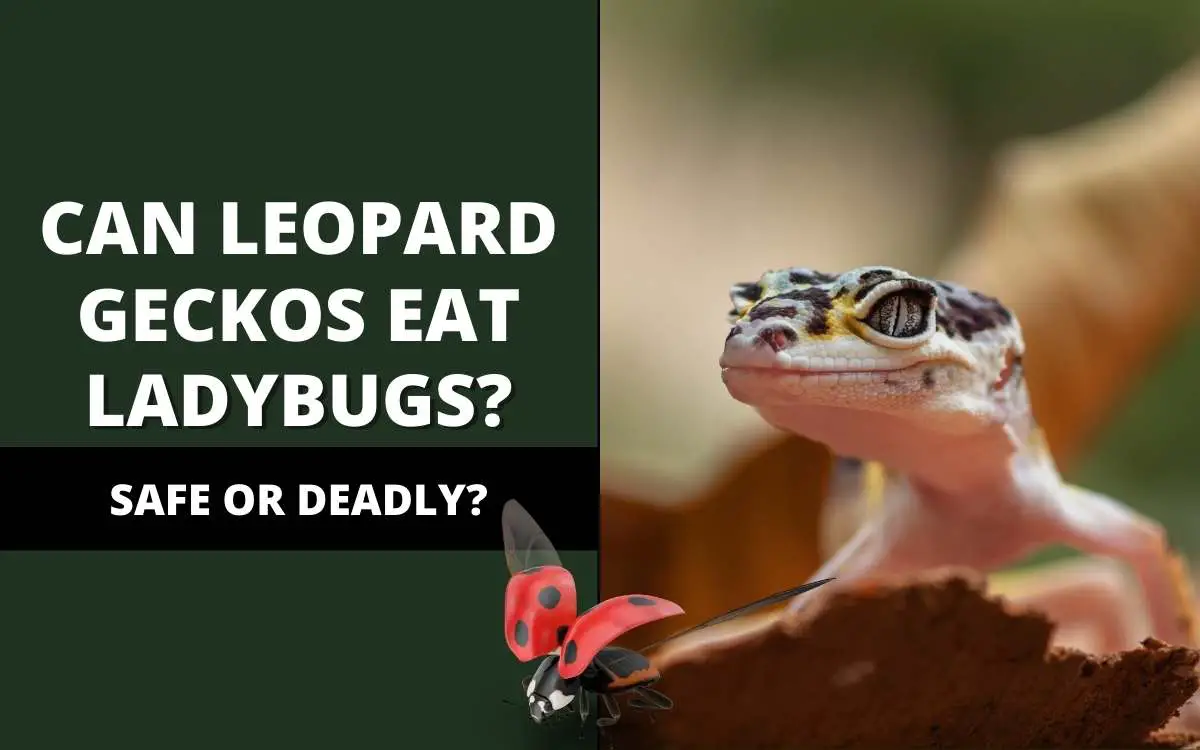Disclaimer: As an Amazon Associate I earn from qualifying purchases. Therefore, we may collect a share of sales from the links on this page, at no extra cost to you!

Leopard geckos require a varied diet consistent of different bugs, vegetables, and the occasional fruit or two.
A varied diet gives leopard geckos the wide range of nutrients they require to live healthily.
However, beyond your average cricket or mealworm, what other bugs can leopard geckos feed on?
What about ladybugs? Can leopard geckos eat ladybugs?
Leopard geckos should not eat ladybugs as they are toxic to reptiles and other small animals and oftentimes contain pesticides which can poison your leopard gecko. Additionally, ladybugs secrete a foul-tasting fluid from their legs when they are threatened by a predator.
However, there are plenty of other bugs that leopard geckos can safely enjoy.
Let’s go over some great alternatives to ladybugs that are just as fun to feed your leopard gecko!
Jump to..
Dubia roaches
Dubia roaches make an amazing snack for leopard geckos.
First, dubia roaches contain a TON of protein. Protein is an essential nutrient to keep your leopard gecko active and and healthy.
Additionally, leopard geckos tend to enjoy the taste of dubia roaches. My leopard gecko can’t stop eating them once I give him one.
Finally, dubia roaches are really easy to deal with. Unlike crickets and other bugs, dubia roaches can’t jump and escape your geckos enclosure. Moreover, they don’t produce a bad odor like ladybugs do.
Read More: Can Leopard Geckos Eat Grasshoppers?
Mealworms
In terms of their health benefits, mealworms contain high amounts of protein and fats.
Additionally, mealworms are readily available at almost any pet store. They’re inexpensive and super easy to transport and maintain.
The only downfall with mealworms is they’re a bit smelly. This isn’t a problem if you’re buying a few at a time. However, if you decide to breed and raise them in order to save money, you may want to put them in a garage or shed.
It is important to note that mealworms contain little calcium. Therefore, you’ll definitely need to dust them with a good calcium powder.
Waxworms
The next bug on our list is waxworms. Waxworms are super tasty treats for leopard geckos.
In fact, because they’re so darn addictive, some pet owners will find their leopard geckos become addicted to them.
Waxworms are easy to swallow and digest – limiting the possibility of impaction. Furthermore, waxworms also contain a lot of protein.
However, due to their addictive nature and very high fat content, you should only feed waxworms on an occasional basis. We suggest once every other week.
Silkworms
Silkworms are another excellent choice for leopard geckos over ladybugs. There’s plenty of advantages to silkworms that make them one of the best foods out there.
First, silkworms are full of nutrients. They’re high in protein, moisture, and healthy fats. Furthermore, they’re soft, super easy to digest, and very tasty.
The only issue with silkworms is finding them. They’re usually not carried in pet stores so you’ll probably have to either buy them online or find a pet store that specializes in reptiles.
However, if you do come across silkworms, they make a great treat that you can feed your leopard gecko on a weekly basis.
Superworms
Superworms are the next treat we’re going to talk about.
Superworms are very similar to mealworms. In fact, the biggest difference between these two worms is the size. Superworms are approximately 5x larger than mealworms.
Another prominent difference is that superworms have much more chitin, the component that makes up the shell, than mealworms. Chitin is full of calcium, fat, and fiber.
So, although superworms are full of vital nutrients, they should be fed in moderation due to their size. We suggest feeding superworms once every 1-2 weeks.
Are Ladybugs Poisonous to Leopard Geckos?
Ladybugs are mildly poisonous to leopard geckos. Although eating a ladybug probably won’t kill your leopard gecko, it is a good idea to keep an eye on them for the next few hours. If your leopard gecko starts experiencing unusual behavior or sick-like symptoms, it is advised to contact a veterinarian.
Can Leopard Geckos Eat Wild Bugs?
The simple answer is no – leopard geckos should never consume wild-caught bugs.
Wild bugs have the risk of carrying pesticides. Additionally, similar to the ladybug, wild bugs may be poisonous to your leopard gecko.
Obviously, you should never give your leopard gecko wild caught bugs. However, if you cannot stop your leopard gecko from eating wild bugs because they’re entering on their own. you need to seal off your leopard geckos enclosure.
Read More: Can Leopard Geckos Eat Spiders?
Conclusion
Although it may be tempting to allow your leopard gecko to indulge in ladybugs, it is probably best to stick with your average diet composed of crickets, mealworms, and fruits/veggies.
However, it’s not harmful to feed your leopard gecko other bugs – given they’re purchased from a reputable breeder.
Dubia roaches, mealworms, waxworms, superworms, and silkworms are some excellent options, just to name a few. Watching your leopard gecko indulge in these critters can be a lot of fun!
Hopefully you were able to take something from this article. As always, have a great day and happy herping!
